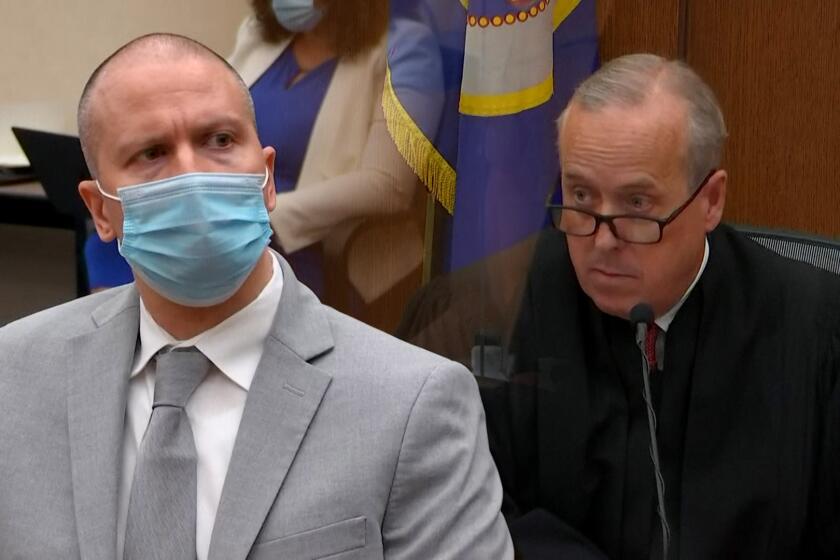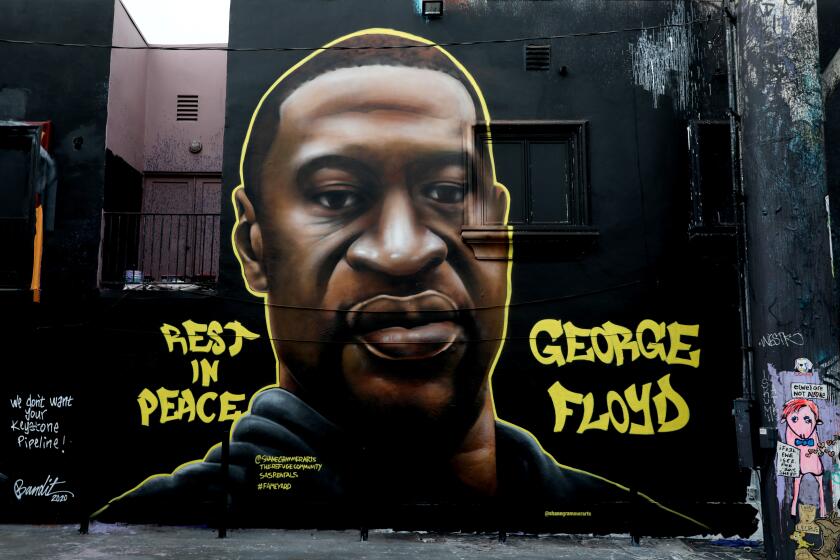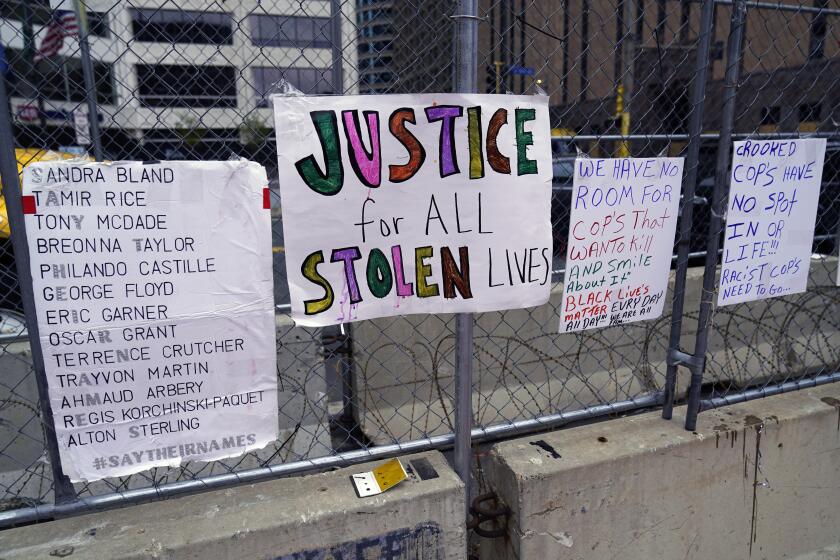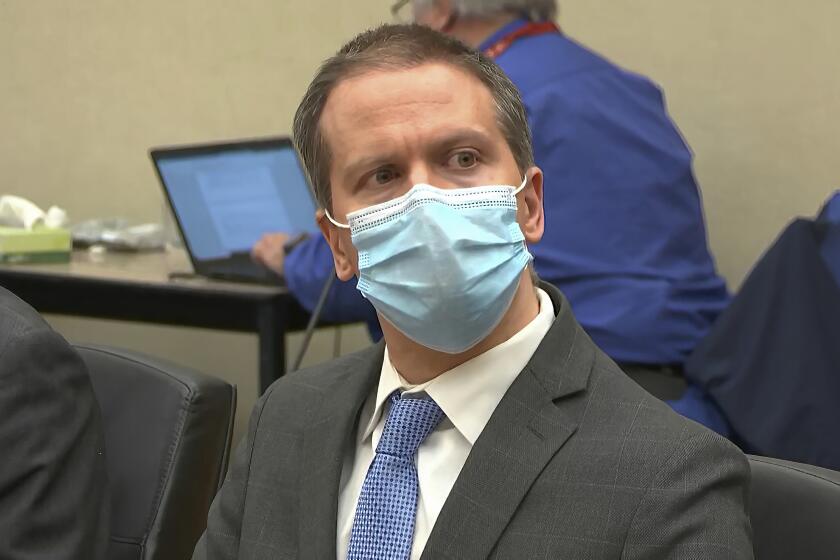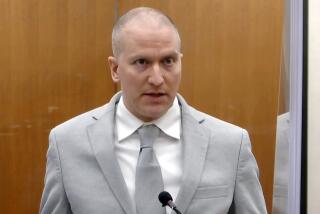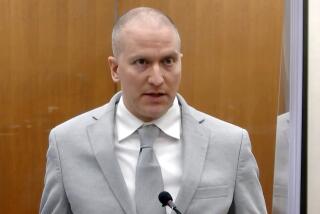George Floyd’s 7-year-old daughter heard at Chauvin’s sentencing: ‘I miss you’
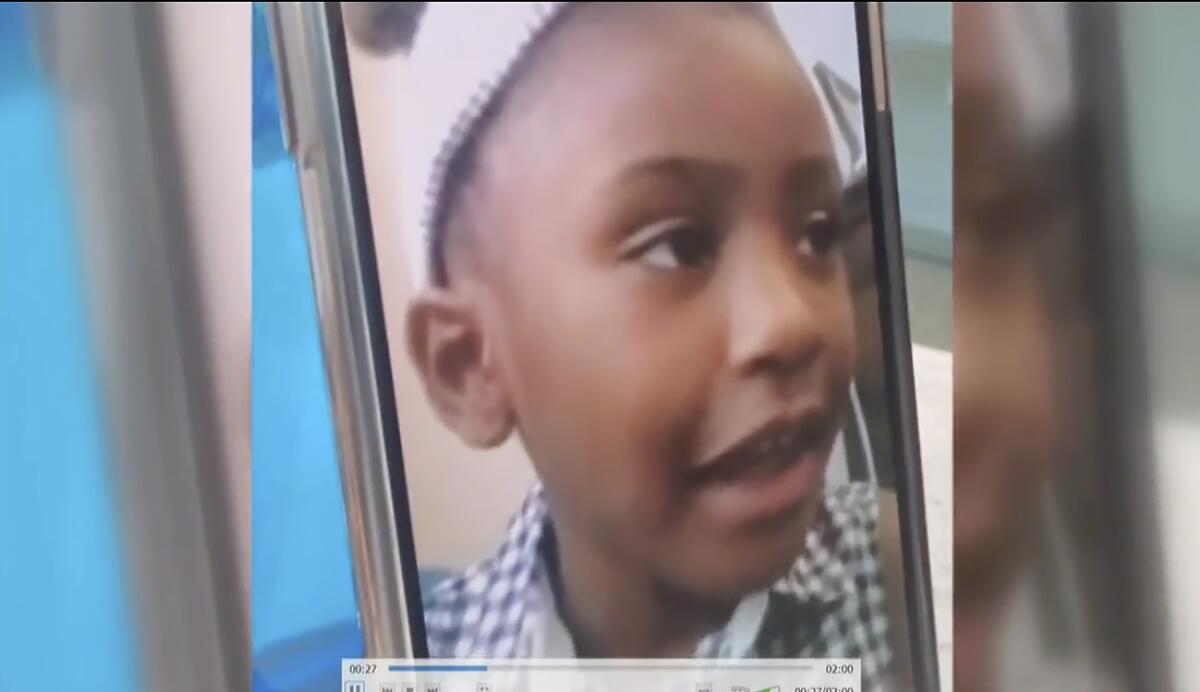
- Share via
MINNEAPOLIS — George Floyd’s 7-year-old daughter said she wishes she could tell her late father that “I miss you and I love you.”
Gianna Floyd’s video interview was played in court Friday during the sentencing hearing for former Minneapolis police Officer Derek Chauvin, who is charged with murder and manslaughter in Floyd’s death.
Former Minneapolis Police Officer Derek Chauvin is sentenced to 22½ years in prison for the murder of George Floyd.
Gianna Floyd said in the victim impact statement that she believed her dad was still with her in spirit and that she wants to know how he got hurt.
“We used to have dinner meals every single night before we went to bed,” she said. “My daddy always used to help me brush my teeth.”
She had a long list of things she would still have liked to do with her father. “I want to play with him, have fun, go on a plane ride.”
Hers was the first of four victim impact statements expected at the sentencing.
An attorney for George Floyd’s family said Friday that family members were feeling anxious ahead of a sentencing hearing for former Minneapolis police Officer Derek Chauvin.
Chauvin was convicted of second-degree unintentional murder and other charges in Floyd’s death on May 25, 2020, and he faces a practical maximum of 30 years when he’s sentenced Friday afternoon.
George Floyd’s brothers asked a judge to impose a harsh sentence against Chauvin.
George Floyd died in police custody on May 25, 2020, in Minneapolis. His death led to the trial and conviction of former officer Derek Chauvin.
“On behalf of me and my family, we seek the maximum penalty,” Terrence Floyd said in his victim impact statement. “We don’t want to see no more slaps on the wrist. We’ve been through that already.”
He said he’s struggling to explain his brother’s death to his own daughter but feels he has to “because this is story.”
“This is the case everybody knows about,” he said. “So she’s going to find out, and I’m gonna have to explain that to her. And I think that’s, to me, harder than even just standing here. That I have to talk to my daughter and tell her, you know, about her niece, about her uncle, about the situation. That’s basically reliving it all over again, years down the line.”
Another of Floyd’s brothers, Philonise Floyd, wiped his eyes and sniffled as he too asked for Chauvin to receive a maximum sentence.
“My family has been given a life sentence,” he said. “We will never be able to get George back.”
Philonise Floyd often occupied the Floyd family’s assigned seat in the socially distanced courtroom where Chauvin’s trial was held. He also testified as part of prosecutors’ efforts to humanize George Floyd to the jury, recalling their childhood in a poor part of Houston and his brother’s knack for making banana mayonnaise sandwiches.
Philonise Floyd testified last year before Congress in support of a federal overhaul of policing just a day after his older brother’s funeral.
Terrence Floyd, a bus driver in New York, also is a frequent representative for the Floyd family at protests and other events. Last fall, he appeared with Joe Biden in the presidential campaign’s final days and separately joined a push encouraging people to vote.
Brandon Williams too has acted as a representative for the broader Floyd family since his uncle’s death, advocating for a federal overhaul of policing and joining other family members who met with Biden at the White House on the anniversary of George Floyd’s death.
“To us, George Floyd is a cause. He’s a case; he’s a hashtag. To them — that’s their flesh and blood. You know, that that’s their brother,” said Ben Crump, an attorney for the Floyd family.
It’s been rare for a police officer to be charged with a crime in the death of a civilian, and winning a conviction is hard.
Crump also said he wanted to see a sentence above what is typically given for a second-degree murder conviction.
“There was nothing typical about what Derek Chauvin did in torturing George Floyd to death,” Crump said. “So we don’t expect it to be a typical sentence. It needs to be a sentence that sets a new precedent for holding police officers accountable for the unjustifiable killings of Black people in America.”
In Minnesota, the presumptive sentence for second-degree unintentional murder for someone with no criminal record like Chauvin is 12 1/2 years, and the judge could sentence Chauvin to up to 15 years while staying within the guidelines. But Judge Peter Cahill has already found that there are aggravating factors that would allow him to go above the state’s sentencing guidelines. Prosecutors are seeking a 30-year sentence, while Chauvin’s defense has asked for probation.
With Chauvin’s sentencing, the Floyd family is experiencing something that few Black American families have experienced since the advent of professional policing in the U.S. The list of acquittals and mistrials, in the rare cases where officers accused of brutality or misconduct have gone to trial, is longer than the list of those convicted and sentenced.
Retributive justice must play a role in the former Minneapolis police office’s sentence for murder. But it should not play the only role.
In recent years, the list of acquittals has included officers tried in the deaths of Philando Castile in suburban Minneapolis, Terence Crutcher in Tulsa, Okla., and two mistrials over the death of Samuel Dubose in Cincinnati.
“That’s why the world has watched this trial, because it is a rare occurrence,” said Arizona-based civil rights attorney Benjamin Taylor, who has represented victims of police brutality in court. “Everybody knows that this doesn’t happen every day.”
“Black people deserve justice,” said Taylor, who is Black.
More to Read
Sign up for Essential California
The most important California stories and recommendations in your inbox every morning.
You may occasionally receive promotional content from the Los Angeles Times.
